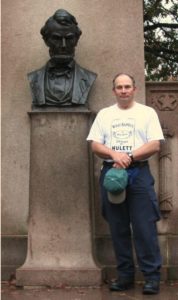Saturday’s first speaker was Edgar Evans Cayce. Hearing his quiet Virginian accent and his gentle and effective humor, I could imagine that his father must have sounded much the same. He described his father, and the process of giving readings, from first-hand memory, one of few people left alive who could do so. As the author, with his brother Hugh Lynn Cayce, of The Outer Limits of Edgar Cayce’s Power, he was able to speak with some knowledge and authority of where his father seemed to get information, and what variables affected it. The former included unconscious memory, telepathy with people living or dead, clairvoyance –Edgar Evans said his father was always right when exercising clairvoyance – and either the akashic records or the mind throughout time and space. The latter included the state of his health, and the emotions and ideals of those around him.
After Mr. Cayce, we did our second RV experiment. This time, three people, one of them a cameraman, went out to an unknown destination somewhere within 20 minutes of the A.R.E. When the 20 minutes was up, Stephan called them, ascertained that they were there, and led us through 15 minutes of RV’ing. When the team returned, they showed the film of where they had been, and it was not at all hard to tell whether or not you had hit the target, for the four possibilities were the Cape Henry lighthouse, a water park, an exhibition center with an RV exhibit (Winnebagos, not psychics!) and a road construction zone. Here, for the first time I actually was able to overcome my tendency toward analytical overlay and self-imposed consistency, and got many elements of the target, which was the lighthouse. A very funny feeling, to suddenly “get it.” By show of hands, it seemed much of the audience did, as well.
After lunch, Dale Graff talked about remote viewing and dreams, telling how an early experience while canoeing on a remote Canadian river led him into the field. In desperate need of a replacement pair of boots, he dreamed where he would find them (though he didn’t know at the time the meaning of the dream) and indeed found them – in the middle of nowhere, apparently abandoned by someone – the next morning. It’s the kind of thing that tends to get one’s attention, I suppose. He differentiates between what he calls CSP (Conscious State Psi) and DSP (Dream State Psi). He’s onto something important here; I wish I had better notes!
Then Henry Reed of the A.R.E. spoke of RV as a tool of self-realization, and I was particularly pleased to hear him single out Skip’s book as being explicitly about spirit. Henry gave a striking example of what he called “value added.” One could give an RVer a set of coordinates and ask “what’s there?” That’s standard practice. But one could then ask, for instance, “how can it be made a more peaceful place?” And this is not standard practice. Should it be? Henry mentioned the difference between Doing Trust and Being Trustworthy. Of course, they are not the same thing. The point is, if Remote Viewing is to become more than a parlor stunt or a scientific demonstration of possibility, all sort of ethical and developmental questions arise.
And after supper, Russell Targ spoke entertainingly and well about just this same kind of thing. He began by noting that Hal Puthoff had been put in front with the scientists while he himself was back with the mystics. Riding that laugh, he pointed out that a mystic never asks you to believe anything, but invites you to find out for yourself. (I found this particularly simpatico, of course. It was Bob Monroe’s approach, all the way.) .Harking back to the Vedic traditions, and ranging freely through modern quantum physics, Russell then talked about the use of psychic abilities for self-inquiry. As he put it, 100 years of data demonstrates that “materialism doesn’t make any sense.” He quoted the Buddha as saying that we give meaning to what happens to us, and paint ourselves into a corner, and we suffer. That is, suffering is the creation of our prejudgment; separation is illusion. To become free, we must trade our conditioned awareness for naked awareness.
